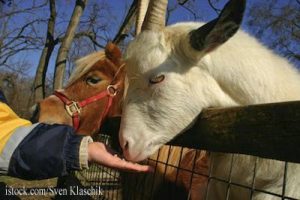An E.coli infection from a petting zoo visit has landed a seven-year-old girl in the hospital battling kidney failure. The girl, one of at least three children to contract E.coli infections after contact with the animals at Dehn’s Pumpkins in Dayton, MN, developed hemoyltic uremic syndrome (HUS), a complication of some E.coli infections, and faces weeks in the hospital. The other children did not require hospitalization.
 About 15 percent of children with E. coli infections develop HUS, the leading cause of pediatric kidney failure in in the United States. Most cases are associated with E. coli O157:H7 , the strain identified in this outbreak.
About 15 percent of children with E. coli infections develop HUS, the leading cause of pediatric kidney failure in in the United States. Most cases are associated with E. coli O157:H7 , the strain identified in this outbreak.
Treatment of HUS can last for weeks and includes blood transfusions, plasma exchange and kidney dialysis. Complications can include hypertension, blindness, seizures, stroke and coma. Some people who develop HUS die, and others can suffer from lifelong health complications, including kidney failure. Some need kidney transplants.
Many people aren’t aware that petting zoos pose an E.coli risk, but they are a common source of outbreaks. “Despite the frequency and severity of these outbreaks, not enough is being done to prevent these severe injuries to children, who are particularly vulnerable to E. coli poisoning and the horrible condition that frequently develops from it, HUS,” said Fred Pritzker, a food safety attorney who publishes Food Poisoning Bulletin and has represented families whose children have been sickened or died from E.coli complications after visiting petting zoos.
Ruminant animals carry E. coli bacteria in their intestines. These bacteria are shed in feces, and can get onto the animal’s coats, and onto bedding and other items in the animals’ environment.
The Minnesota Department of Health has determined that the children who became sick visited the farm on October 12 or 13, 2013, and became ill on October 16 or 18, 2013. There are two other cases that may be part of the outbreak. The investigation is ongoing.




